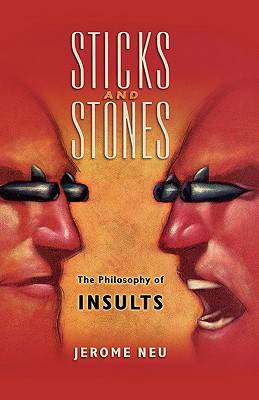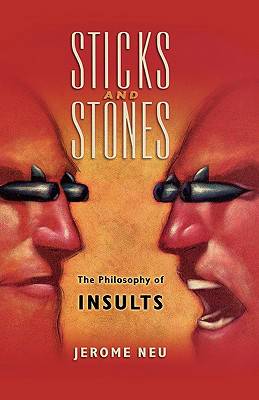
- Afhalen na 1 uur in een winkel met voorraad
- Gratis thuislevering in België vanaf € 30
- Ruim aanbod met 7 miljoen producten
- Afhalen na 1 uur in een winkel met voorraad
- Gratis thuislevering in België vanaf € 30
- Ruim aanbod met 7 miljoen producten
Zoeken
€ 146,95
+ 293 punten
Uitvoering
Omschrijving
"Sticks and stones may break my bones but words will never hurt me." This schoolyard rhyme projects an invulnerability to verbal insults that sounds good but rings false. Indeed, the need for such a verse belies its own claims. For most of us, feeling insulted is a distressing-and distressingly common-experience.
In Sticks and Stones, philosopher Jerome Neu probes the nature, purpose, and effects of insults, exploring how and why they humiliate, embarrass, infuriate, and wound us so deeply. What kind of injury is an insult? Is it determined by the insulter or the insulted? What does it reveal about the character of both parties as well as the character of society and its conventions? What role does insult play in social and legal life? When is telling the truth an insult? Neu draws upon a wealth of examples and anecdotes-as well as a range of views from Aristotle and Oliver Wendell Holmes to Oscar Wilde, John Wayne, Katherine Hepburn, and many others-to provide surprising answers to these questions. He shows that what we find insulting can reveal much about our ideas of character, honor, gender, the nature of speech acts, and social and legal conventions. He considers how insults, both intentional and unintentional, make themselves felt-in play, Freudian slips, insult humor, rituals, blasphemy, libel, slander, and hate speech. And he investigates the insult's extraordinary power, why it can so quickly destabilize our sense of self and threaten our moral identity, the very center of our self-respect and self-esteem.
Entertaining, humorous, and deeply insightful, Sticks and Stones unpacks the fascinating dynamics of a phenomenon more often painfully experienced than clearly understood.
In Sticks and Stones, philosopher Jerome Neu probes the nature, purpose, and effects of insults, exploring how and why they humiliate, embarrass, infuriate, and wound us so deeply. What kind of injury is an insult? Is it determined by the insulter or the insulted? What does it reveal about the character of both parties as well as the character of society and its conventions? What role does insult play in social and legal life? When is telling the truth an insult? Neu draws upon a wealth of examples and anecdotes-as well as a range of views from Aristotle and Oliver Wendell Holmes to Oscar Wilde, John Wayne, Katherine Hepburn, and many others-to provide surprising answers to these questions. He shows that what we find insulting can reveal much about our ideas of character, honor, gender, the nature of speech acts, and social and legal conventions. He considers how insults, both intentional and unintentional, make themselves felt-in play, Freudian slips, insult humor, rituals, blasphemy, libel, slander, and hate speech. And he investigates the insult's extraordinary power, why it can so quickly destabilize our sense of self and threaten our moral identity, the very center of our self-respect and self-esteem.
Entertaining, humorous, and deeply insightful, Sticks and Stones unpacks the fascinating dynamics of a phenomenon more often painfully experienced than clearly understood.
Specificaties
Betrokkenen
- Auteur(s):
- Uitgeverij:
Inhoud
- Aantal bladzijden:
- 304
- Taal:
- Engels
Eigenschappen
- Productcode (EAN):
- 9780195314311
- Verschijningsdatum:
- 7/12/2007
- Uitvoering:
- Hardcover
- Formaat:
- Genaaid
- Afmetingen:
- 148 mm x 216 mm
- Gewicht:
- 453 g

Alleen bij Standaard Boekhandel
+ 293 punten op je klantenkaart van Standaard Boekhandel
Beoordelingen
We publiceren alleen reviews die voldoen aan de voorwaarden voor reviews. Bekijk onze voorwaarden voor reviews.











